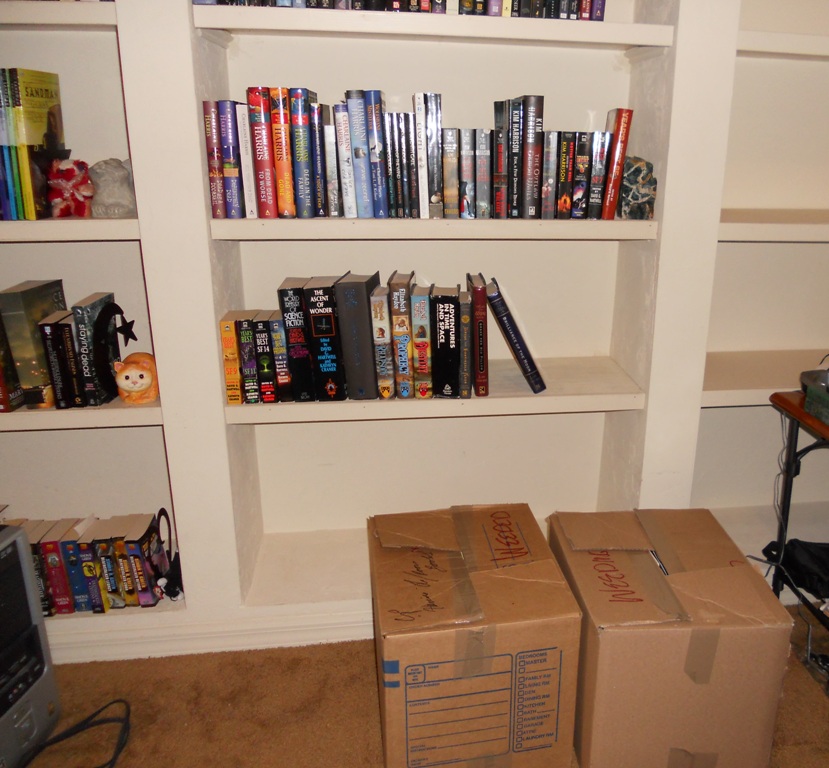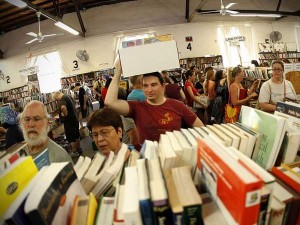Over the weekend, the great weeding project of 2011 finally got started. This is a fairly daunting task, as this is an 1,800 sq. ft house, and there are books in every room except the laundry room. At least, I’m pretty sure there are no books in the laundry room. When we moved here, we rented a house this size in order to finally have enough room to shelve all the books. And, we still didn’t make it past the letter R.
In about a day and a half, Galen and I went through 935 books, shifted over 600, and boxed over 300. The process temporarily halted at the late, and sometimes great, Robert A. Heinlein.
![]() We’ve added everything to Library Thing, whether we’ve kept it or not, and tagged it appropriately, hence the statistics. (If anyone is interested in our process, just ask) The fascinating thing about the listings has been the automatic suggestions that the collection has generated. So many of the suggestions are books that we do have, they are just later in the alphabet. But the others, well, just what I needed, a neat new toy to play with that will generate even more TBRs.
We’ve added everything to Library Thing, whether we’ve kept it or not, and tagged it appropriately, hence the statistics. (If anyone is interested in our process, just ask) The fascinating thing about the listings has been the automatic suggestions that the collection has generated. So many of the suggestions are books that we do have, they are just later in the alphabet. But the others, well, just what I needed, a neat new toy to play with that will generate even more TBRs.
The question about what to do with the books we have weeded, and why we are weeding them, circles back to the questions about the aftermarket of used books in general. These are books. They are still readable, and someone can still get still get lost in them. But how do we effectively get rid of this many? And what happens to used book stores and sales in the future, when more and more readers like us read ebooks instead of paper. The news last week showed that ebooks sold more than print books in February. We, the reading public, have reached the tipping point.
 The Friends of the Library here is having their semi-annual book sale this weekend. It is a five-day event that will probably bring in over $150,000 for the group. They are extremely successful, rightfully so, and fund literacy projects in the community in addition to the work they do with the local library. What happens to groups like this in 3-5 years when readers no longer have book collections to donate? People will still want books to read, but where will those books come from? I suspect I am like many ebook readers, in that what I am interested in is the content and not the container. But I can’t re-sell or donate my used ebooks when I am done with them. The long term implications of this trend are staggering.
The Friends of the Library here is having their semi-annual book sale this weekend. It is a five-day event that will probably bring in over $150,000 for the group. They are extremely successful, rightfully so, and fund literacy projects in the community in addition to the work they do with the local library. What happens to groups like this in 3-5 years when readers no longer have book collections to donate? People will still want books to read, but where will those books come from? I suspect I am like many ebook readers, in that what I am interested in is the content and not the container. But I can’t re-sell or donate my used ebooks when I am done with them. The long term implications of this trend are staggering.
 Meanwhile, we have a “metric buttload” of books to get rid of, and it’s growing nightly. The local used book store will only give cash for hardcovers and trade paperbacks, with a store credit for mass market paperbacks. While I understand their position, since we are leaving for Atlanta in six weeks, a store credit doesn’t help much. Powell’s Books in Portland, OR will buy books online based on the ISBN. Admittedly, Powell’s is also giving a store credit, but the store is online, so it is much easier to spend. And they now do ebooks through the Google bookstore. We still haven’t used the credit from last time, but we’re going to do that again. With the addition of the ebook option, the credit won’t last long.
Meanwhile, we have a “metric buttload” of books to get rid of, and it’s growing nightly. The local used book store will only give cash for hardcovers and trade paperbacks, with a store credit for mass market paperbacks. While I understand their position, since we are leaving for Atlanta in six weeks, a store credit doesn’t help much. Powell’s Books in Portland, OR will buy books online based on the ISBN. Admittedly, Powell’s is also giving a store credit, but the store is online, so it is much easier to spend. And they now do ebooks through the Google bookstore. We still haven’t used the credit from last time, but we’re going to do that again. With the addition of the ebook option, the credit won’t last long.
 I’m also going to try Book Mooch for some of what Powell’s doesn’t take. This is a service where you get credit for listing your books, and you pay shipping to send the book to the person who wants it, and get credit for that transaction, too. In return, I can receive books I want from other people, based on my accumulated credit. A friend recommends this service, so I’m interested in trying it, especially for the long term possibilities. There are just too many books in the short term to deal with the shipping charges–success might be it’s own punishment!
I’m also going to try Book Mooch for some of what Powell’s doesn’t take. This is a service where you get credit for listing your books, and you pay shipping to send the book to the person who wants it, and get credit for that transaction, too. In return, I can receive books I want from other people, based on my accumulated credit. A friend recommends this service, so I’m interested in trying it, especially for the long term possibilities. There are just too many books in the short term to deal with the shipping charges–success might be it’s own punishment!
We will not throw any books away. Whatever we can’t send to Powell’s or doesn’t look like a candidate to be Mooched will go to the Friends of the Library as soon as they re-open for donations. It takes them a little while to recuperate after one of their sales extravaganzas.
I thought it would make it easier to pass along some of these books if I just kept a record of what I had read, but it isn’t. Even reduced by a third, this will still be a big personal library. And I recognize that some of these books are ones that I won’t pick up again, and that there is someone out there who will enjoy them if I let them go. But damn, it’s hard.
